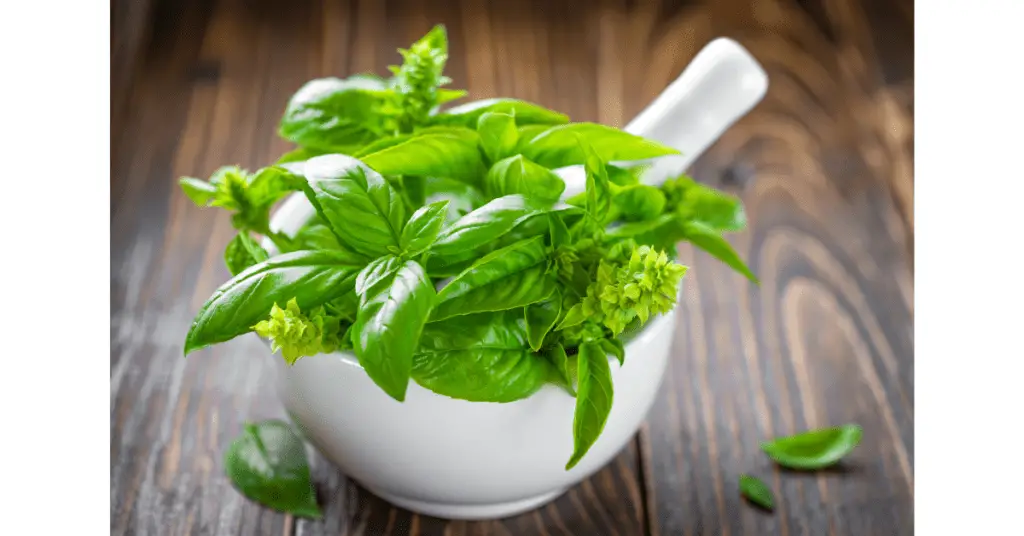
Dogs are wonderful companions, and as pet owners, we often want to share our favorite foods with them. But what about basil? How much basil can i give my dog? and is it safe for them? In this pet-friendly guide, we’ll dive into the world of dogs and basil. We’ll explore whether dogs can enjoy basil, if it’s harmful to them, and just how much basil you can give to your furry friend.
Can Dogs Eat Basil?
If you’ve ever wondered, “Can dogs eat basil?” the answer is a resounding yes! Dogs can enjoy this fragrant herb in moderation. Basil is not toxic to dogs and can even provide some health benefits. However, as with any new addition to your dog’s diet, there are a few things you should know.
Dogs and Basil: A Flavorful Connection
Dogs, like humans, have taste preferences, and some may love the taste of basil, while others might not be too enthusiastic. It’s like the way we humans have different tastes – some folks adore spicy food, while others prefer something sweet.
Is Basil Bad for Dogs?
The good news is that basil is generally not bad for dogs. It’s safe for them to nibble on a little basil from time to time. In fact, basil can provide a fresh and exciting flavor for your four-legged friend. It’s like a culinary adventure for your pup’s taste buds!
Do Dogs Like Basil?
Now, the big question: do dogs like basil? Just like with people, individual preferences vary. Some dogs might gobble up basil like it’s a tasty treat, while others might sniff it and walk away. It’s similar to how we have different preferences for certain foods – you might adore pizza while your friend prefers a burger.
The Right Portion: How Much Basil Can I Give My Dog?
When it comes to treating your dog with basil, moderation is key. You don’t want to overwhelm your furry companion with this herb. Think of it like seasoning a dish – a little bit goes a long way. So, how much basil can you give your dog without overdoing it?
Incorporating Basil Safely
Just like in cooking, it’s essential to incorporate basil safely into your dog’s diet. A pinch or two of fresh basil leaves can be a delightful addition to their meal. This is akin to adding a sprinkle of salt to your own plate to enhance the flavors.
Basil as an Occasional Treat
While basil is generally safe for dogs, it should be considered an occasional treat rather than a daily staple. Think of it like a special dessert – it’s something your pup can savor now and then.
Health Benefits of Basil for Dogs

Basil, a popular culinary herb, not only adds flavor to dishes but also offers potential health benefits for dogs when consumed in moderation. Here are some of the health benefits associated with feeding basil to dogs:
- Rich in Antioxidants: Basil contains antioxidants that help combat oxidative stress and may support your dog’s overall health Antioxidants play a vital role in neutralizing harmful free radicals within the body, helping maintain overall well-being.
- Anti-Inflammatory Properties: Basil possesses anti-inflammatory properties, which can be beneficial for dogs with inflammatory conditions. It may help in reducing inflammation and associated discomfort.
- Possible Anti-Microbial Effects: Some studies suggest that basil may have antimicrobial properties, which could help in fighting off certain types of bacteria and microbes that could harm your dog’s health.
- Potential Digestive Aid: Basil may aid in digestion and alleviate minor digestive issues in dogs. It could help in soothing the digestive tract and promoting healthy digestion.
- Vitamin and Mineral Content: Basil contains essential vitamins such as vitamin K, which is important for blood clotting, and vitamin A, crucial for vision and immune function. It also provides minerals like iron, calcium, and potassium, which are necessary for various bodily functions.
- Calming Effect: Some dogs may find the aroma of basil calming. It could potentially help dogs with anxiety or stress, creating a soothing environment for them.
Potential Risks of Feeding Basil to Dogs
While basil is generally considered safe for dogs and can even offer some health benefits when given in moderation, like any food, it’s important to be aware of potential risks. Here are some considerations to keep in mind before sharing basil with your furry friend:
Digestive Upset: Feeding your dog a large amount of basil or introducing it suddenly into their diet can potentially lead to digestive issues such as stomach upset, diarrhea, or vomiting. Dogs, like humans, need gradual introductions to new foods.
Allergic Reactions: Although rare, some dogs might have an allergic reaction to basil. Signs of an allergic response can include itching, skin irritation, swelling, or difficulty breathing. If you notice any of these symptoms, cease giving basil and consult your veterinarian.
High Quantity Concerns: While a small amount of basil is generally safe, large quantities can be problematic due to the essential oils found in basil. High amounts of essential oils can cause gastrointestinal irritation in dogs.
Interaction with Medications: Basil, when consumed in significant quantities, might interact with certain medications your dog may be taking. Always consult your veterinarian if your dog is on any medications before introducing new foods.
How to Serve Basil to Dogs
Adding basil to your dog’s diet can be a tasty and healthy treat when done in the right way. Here’s a simple guide on how to serve basil to your furry friend:
- Start with fresh basil leaves. Ensure they’re thoroughly washed to remove any dirt, pesticides, or residues that might be present.
- Chop the basil into small, manageable pieces. This not only aids your pup in comfortable consumption but also minimizes the chance of choking.
- A common way to serve basil to dogs is by mixing it with their regular food. Sprinkle a small amount of chopped basil over their meal.
- Incorporate basil into homemade dog treats. You can find various dog-friendly recipes online that include basil as an ingredient.
- Freeze chopped basil in water to create basil-infused ice cubes. Your dog can enjoy these as a refreshing treat on a hot day.
- Add basil leaves to homemade broths. Once the broth is cooled, strain out the leaves and offer a small amount to your dog.
- If using basil in homemade treats or meals, ensure it’s not mixed with harmful seasonings like garlic or onion, which are toxic to dogs.
Related Questions
Is Basil Safe for Puppies?
If you have a puppy, you might be wondering if basil is safe for them. Puppies have delicate digestive systems, so it’s even more crucial to introduce new foods slowly and in moderation. Think of it like caring for a newborn – their tiny stomachs need gentle handling.
Can dogs eat basil every day?
It’s not advisable to feed dogs basil every day. Basil should be given to dogs in moderation and as an occasional treat. While basil is generally safe for dogs, overdoing it can potentially lead to digestive issues. Like with any new food, it’s important to introduce it gradually and monitor how your dog reacts. Always consult your vet before making significant changes to your dog’s diet.
Can dogs eat raw basil?
Yes, dogs can eat raw basil in small quantities. Raw basil is safe for dogs and can be a flavorful addition to their diet. However, ensure it’s clean and free from any pesticides or contaminants. Chop it into small, manageable pieces to prevent choking hazards and mix it with their food or use it as a garnish.
Can dogs taste basil?
Yes, dogs can taste basil just like humans. They have taste buds that can detect various flavors, including the unique taste of basil. Some dogs may enjoy the taste of basil, while others may have different preferences. Each dog is unique, and their reactions to new flavors can vary.
What kind of basil can dogs eat?
Dogs can eat common sweet basil (Ocimum basilicum), which is the most typical variety of basil used in cooking. It’s important to stick to this variety and avoid other types of basil that might have different properties or essential oil content. Always opt for fresh, clean basil leaves and chop them into small, dog-friendly pieces.
Do dogs like the smell of basil?
Dogs have a keen sense of smell, and some may find the aroma of basil interesting or appealing. However, each dog is different, and their preferences can vary. Some dogs might enjoy the scent of basil, while others may not show much interest. As with taste, dogs have unique reactions to different smells based on their individual preferences.
Conclusion
In the world of dogs and basil, the verdict is clear: dogs can enjoy basil as an occasional treat. While basil isn’t harmful to dogs and may offer some health benefits, it’s essential to remember that every dog is unique. Just as we all have different tastes, our furry companions have their preferences too. So, the next time you’re in the kitchen, feel free to share a tiny taste of basil with your dog, but always do so in moderation. It’s a bit like sharing a slice of your favorite pie – a small bite can be a delightful experience for both of you. And as always, consult your vet for the best advice on your dog’s diet.

Can you be more specific about the content of your article? After reading it, I still have some doubts. Hope you can help me.
I don’t think the title of your article matches the content lol. Just kidding, mainly because I had some doubts after reading the article.